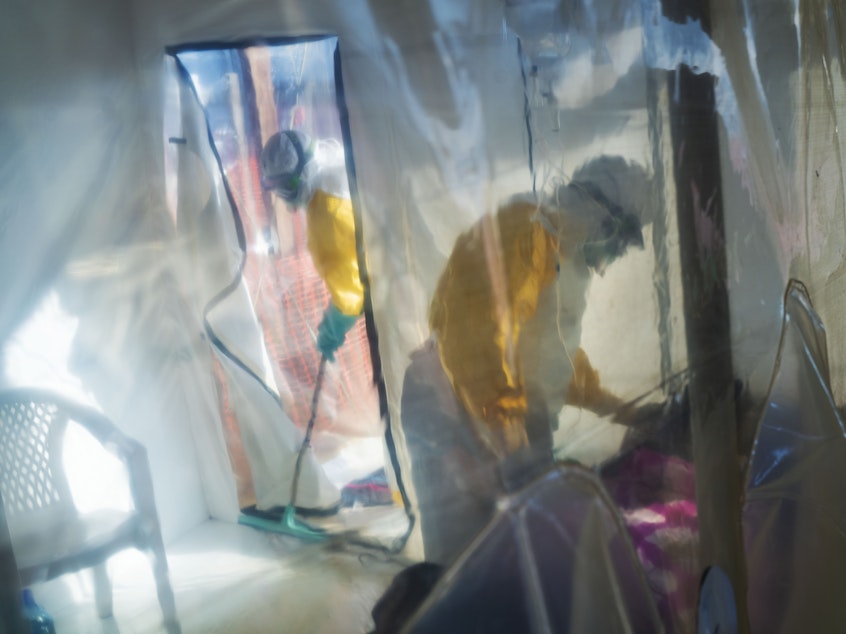2 Experimental Ebola Drugs Saved Lives In Congo Outbreak

Researchers say they have identified the first clearly effective treatments for Ebola, a deadly disease that continues to spread in central Africa. The experimental drugs will be made widely available in the centers that have already treated thousands of patients.
This achievement is particularly notable given the extraordinary circumstances: Scientists in the Democratic Republic of Congo have been running a study in the midst of a deadly epidemic and in the face of armed assaults on doctors.
They've been comparing four potential treatments to see whether any or all can hold the Ebola virus in check. When scientists took a peek at the data last Friday, as a standard part of the testing protocol, they discovered that two of the experimental drugs were performing notably better than the other two.
"We now have seen that there are at least two therapies that are showing a beneficial effect in prolonging the life or decreasing the mortality of Ebola virus disease," said Dr. Anthony Fauci, head of the National Institute of Allergy and Infectious Diseases. "It is certainly not a total cure at all, but it clearly has shown a beneficial effect."
The two drugs that showed more benefit are monoclonal antibodies. They help the immune system fight off infection. One is made by Regeneron, the other, called "monoclonal antibody 114," or mAb114, was developed jointly by the NIAID and scientists in Africa.
Sponsored
Those two products outperformed a drug called ZMapp, which had been developed in a previous outbreak and had shown some signs of success at the time. The fourth drug was a conventional antiviral medication called remdesivir.
About half of all patients died when they took the latter two drugs. But for the other two, mortality was about 30%. And people who got into treatment early did much better than that. Only 6% of the relatively healthy patients died if they took the Regeneron drug, Fauci said, and 11% died in the healthier group taking mAb114.
"These two are certainly the first therapies that have clearly shown a beneficial effect," Fauci told NPR.
The study will continue with just these two drugs, which will be compared head to head. But they will also be made available to all Ebola patients who come to treatment centers in the DRC.
More drug is being manufactured right now, Fauci says, "so this is not going to be a problem of drug supply."
Sponsored
Joining Fauci in announcing these findings were Dr. Jean-Jacques Muyembe-Tamfum, director general of the DRC's medical research institute, and Dr. Michael Ryan, who runs the World Health Organization's Health Emergencies Programme.
Ryan says right now, people aren't coming in for treatment promptly, and that's a problem. First, people who delay treatment are less likely to survive.
"The second and very important consequence," he says, "is that those patients spend longer amongst their family and friends and potentially expose other people in the community. So getting people into care more quickly is absolutely vital."
The challenge for doctors in the region is to convince people to leave their homes and seek that care despite a climate of distrust around the Ebola clinics.
"We are still seeing too many people staying away from Ebola treatment units, too many people not coming to hospital, or not being found in time to benefit from these therapies," he says.
Sponsored
Muyembe said he believes that once communities learn there is an effective treatment, they will come to treatment centers promptly. The drugs by themselves won't end the outbreak, but they can certainly help.
You can reach NPR Science Correspondent Richard Harris at rharris@npr.org. [Copyright 2019 NPR]


